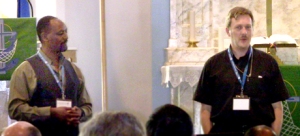Helping meet intercultural ministry needs
While Canada celebrates its multiculturalism, Lutheran Church–Canada (LCC) encourages inter-culturalism—Gospel proclamation in churches and congregations where Lutherans from around the world, now living in Canada, receive God’s gifts in Word and Sacraments.
For many adult new Canadians, the first task is learning English, then adapting to the culture, which includes how Lutherans in Canada worship. This can be a long and frustrating process. In the meantime, there is still a need for pastoral care which relates to an immigrant’s home culture and language.

During a recent intercultural ministry conference, PAT student Assefa Aredo and mentor Rev. Richard Beinert discussed how they work together.
In 2002, LCC approved a program to help meet these unique cultural challenges by adopting in Convention a resolution creating the Pastors with Alternate Training (PAT) program. The concept is to prepare men to serve as pastors in specific cultural communities or in special geographical circumstances.
Under the supervision of LCC’s Council of Presidents and with educational and theological support from LCC’s seminaries, eleven men are currently studying for pastoral ministry to their cultural communities. These include men from Central America, Sudan, Ethiopia, Haiti, India, Pakistan and Africa. They receive instruction in English or French.
Rev. Dr. Leonardo Neitzel, LCC’s mission executive, coordinates the program working with a committee comprising Rev. Dr. Glenn Schaeffer (Concordia Lutheran Seminary, Edmonton adjunct professor); Rev. Richard Beinert (Immanuel, Winnipeg and PAT instructor/mentor) and Rev. James Keller (Concordia Lutheran Theological Seminary, St. Catharines, instructor). Together they are reviewing the program and redeveloping the curriculum and evaluation system.
“I have spent a lot of time looking at a similar program offered through Concordia Seminary, Ft. Wayne, as well as how we teach and what we teach in our seminary programs in Nicaragua, Thailand and Ukraine,” explained Dr. Neitzel, a former seminary professor in Brazil. “The overseas seminary instruction relies on concentrated time for instruction. Our PAT students study part-time which means the preparation takes longer.”
Each PAT student works with a mentor pastor (or pastors) in his city. After completing basic courses, he receives a license to lead services and preach under the supervision of an ordained pastor. When he has completed the PAT program, with the approval of the Council of Presidents the PAT graduate is ordained and serves in the Office of the Holy Ministry.
With a well-established ministry to Chinese, Korean and Hispanic communities, LCC is now meeting the challenge of more immigrants from other parts of the world, some of whom have roots in the Lutheran church. Dr. Neitzel observes that as Canada “welcomes more than 250,000 immigrants each year, the Lord is giving us new opportunities and providing new workers to share the Gospel.”




